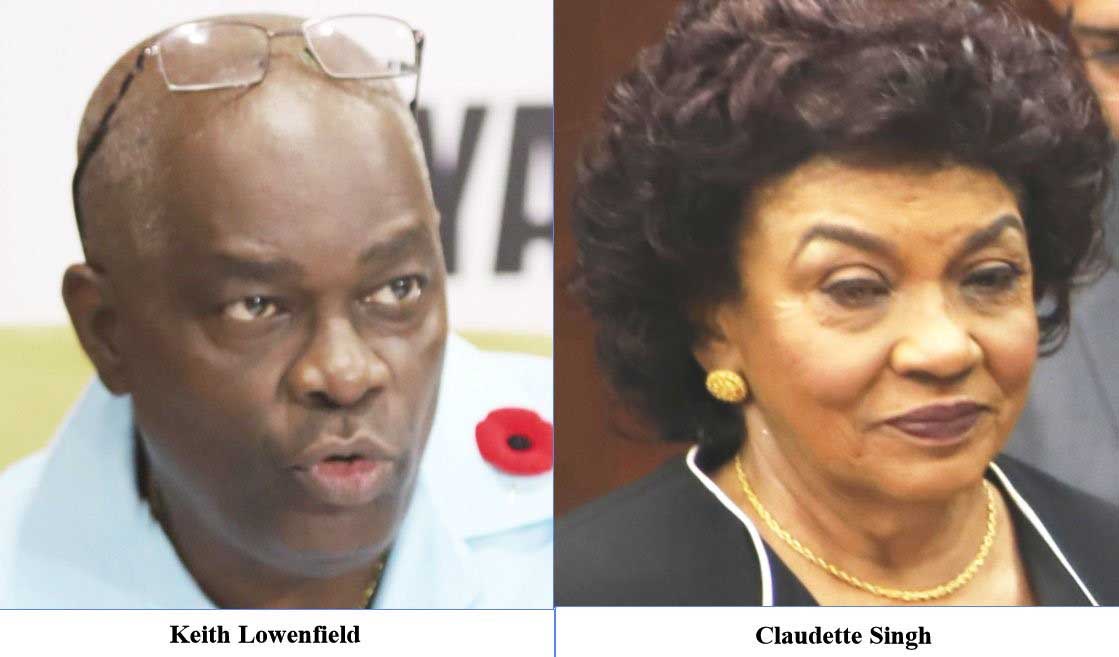Introduction
Today marks one year to the day since Guyanese went to the polls to exercise their democratic right, triggering a five-month battle to uphold free and fair elections which saw thousands of persons rallying to defend democracy and the international community exerting swingeing pressure on the APNU+AFC government to comply with democratic principles.
It was not until August 2nd 2020 that Irfaan Ali was sworn in as President and after months of crises over what were naked attempts to rig the elections and reinstall the incumbent President David Granger.
Despite having agreed to a CARICOM supervised recount of all of the ballots from the March 2nd elections which was meant to form the basis for a long-awaited declaration of the result, Granger repudiated the findings of the recount which showed that the PPP/C had won and surrogates for APNU+AFC then initiated several cases and appeals in the court to thwart a lawful declaration. These efforts to prevent the swearing in culminated at the end of July after a defeat for an APNU+AFC supporter at the Court of Appeal and unrelenting pressure from the US, UK, Cana-da, the European Union, the Organisation of American States (OAS), the Common-wealth, CARICOM and others for the recount result to be used as the basis for swearing in Ali.
There were many standout moments during the five months including a confrontation between Minister of Foreign Affairs Dr Karen Cummings and the Head of the Commonwealth team of observers, the late former Prime Minister of Barba-dos Owen Arthur after the minister had threatened to pull the accreditation of the team.
There was also an extraordinary visit by the representatives of the ABCEU countries to the Guyana Defence Force when concerns were raised that APNU+AFC would not agree to a transfer of power.
Rigging of the District Four result was also dramatically demonstrated at a General Council meeting of the OAS in Washington by the head of its observer mission, the former Jamaican Prime Minister Bruce Golding.
Above all else dozens of ordinary Guyanese and political party representatives guarded the ballot boxes at the GECOM Headquarters and at the Arthur Chung Conference Centre for months as these contained the truth of the elections and any attempt to interfere with them would have made it impossible to verify a final result.
All of this coincided with the emergence of the COVID 19 pandemic here and the required precautions.
A summary of the key legal battles follows:
The March 2nd, 2020 elections had long before been touted as perhaps being the most important in the country’s history.
Whether it was because it came on the heels of repeated significant oil finds; whether it was because it followed the 2018 fall of the A Partnership for National Unity + Alliance for Change (APNU+AFC) Coalition’s government in a successful vote of no-confidence brought against it by the then Opposition Peoples Progressive Party/Civic (PPP/C); whether it was because it was preceded by controversy surrounding former President Granger’s unilateral appointment of a Chairman of the Guyana Elections Com-mission (GECOM) or for the myriad of other reasons perhaps held by each voter.
One thing seemed, however, sure among the electorate—that irrespective of the manifold expressions used to describe those polls, the general consensus was simply that it would be the “mother of all elections.”
What no one could have perhaps imagined, however, is that an anxious nation would have to wait an unprecedented five months to the day before the results of those polls would be officially declared.
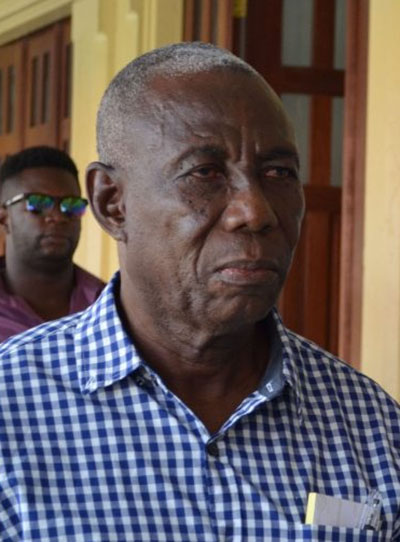
While the voting process itself had been declared free and fair, the declaration of the results soon became marred in controversy—more specifically, the results for Region 4—the country’s largest electoral district.
Returning Officers (RO) for all the other nine electoral districts had completed making declarations for those respective regions.
However, RO for Region Four, Clairmont Mingo abandoned the use of Statements of Poll for the tabulation of the results and instead inserted fictitious figures into a spreadsheet intended to show that APNU+AFC had won the district and the general elections. Despite strenuous objections to his chicanery, Mingo proceeded on March 5th to officially declare the rigged result at the Ashmins Building as the final one for the district, raising the prospect of an unlawful swearing in of the incumbent President.
In what will be seen as a key step in preventing this illegal swearing in, Justice Navindra Singh on March 5th granted an injunction to the PPP/C preventing the declaration of the results for the district.
That would be the beginning of a long and tumultuous legal battle primarily between the APNU+AFC and the PPP/C, which saw a barrage of litigation being mounted in what at one point seemed an unending fight.
In some instances, cases went all the way to the Trinidad-based final court—the Caribbean Court of Justice (CCJ) only to be refiled all over again by the APNU+AFC before the local courts which had to repeatedly declare that the same issues could not be re-litigated having already been determined.
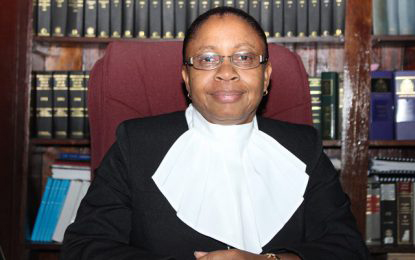
On March 5th, 2020 GECOM released the rigged Region 4 results to the media, which purported to show an APNU+AFC win by around 7,000 votes. On that very day, however, lawyers for the PPP/C secured an injunction from Justice Singh against GECOM, its Chief Election Officer (CEO) Keith Lowenfield and Mingo, prohibiting them from declaring the election results arguing that it was not being done in compliance with the law.
GECOM, Lowenfield and Mingo had controversially declared the results for the district, which showed the APNU+AFC coalition securing 136,335 of the valid votes cast compared with 77,259 votes secured by the PPP/C.
Six days later—on March 11th, 2020, acting Chief Justice Roxane George-Wiltshire SC ruled that there had been substantial non-compliance by Mingo in his purported declaration of results for District 4 and that the results were therefore null, void and vacated.
She also ordered that GECOM could not declare a final result until the declaration for Region 4 was properly done.
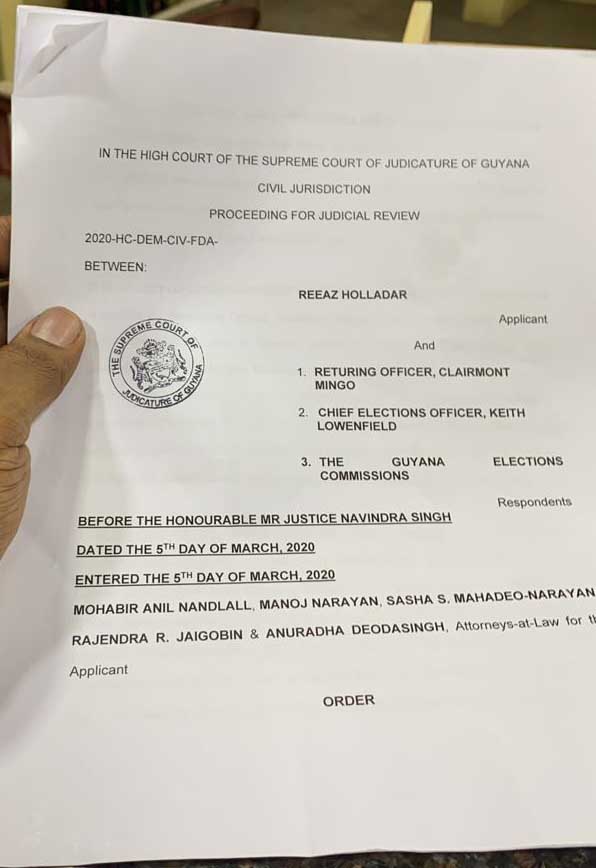
The Chief Justice had ordered that no final declaration could be made unless the vote count was completed in a transparent manner before the persons duly authorized to be present—a requirement which she said was mandatory and not merely directory
This, she observed, would preserve the integrity of the process and ensure confidence in the Commission which is to be transparent, impartial and fair and to “publicly” declare results as required by RoPA.
Though the Chief Justice found the declaration to be unlawful, she made it clear that it is within the ambit of GECOM alone, to decide whether it would restart the process of tabulating and presenting the votes, or whether it would continue from where it had previously left off.
Also, Justice George-Wiltshire made it clear that it was for the RO, who alone has the statutory duty, to decide on the manner and method to be used for validating the vote count, and no one else.
Against this background the judge had pointed out that observers and party agents alike had absolutely no say, though she said that the RO must act in a transparent, reasonable manner.
While the verification process of the tabulation of votes for District 4 had gotten underway on March 4th, it had been halted with the understanding that it would be resumed later that day. However, following a commotion which erupted at GECOM’s command centre between local party observers on both the government and opposition sides, Mingo began announcing the results for District 4 on March 5th.
His attempts were, however, drowned out by loud shouting from members of the opposition and other political parties. It was after this that GECOM’s Public Relations Officer Yolanda Ward disseminated the results to the media via WhatsApp.
The statutory Declaration Form 24 was signed by Mingo and countersigned by APNU+AFC Counting Agent Volda Lawrence.
Noting that blame was to be assigned on all sides for the manner in which the proceedings degenerated into mayhem at the command centre, the chief judge had said that greater responsibility needed to be shown by the political parties and respect for each other for the process to conclude.
The judge had said that it was for the RO to decide in accordance with the law the way forward as well as the persons to be present during the tabulation process.
Section 86 (1) of the Act states that no person shall be present at the counting of votes except the Returning Officer and such other election officers as he may appoint to assist him in the counting, members of the Commission, duly appointed candidates and such other persons as, in the opinion of the RO, have good reason to be present.
Justice George-Wiltshire had said that it was therefore the RO who has the discretion regarding the prescribed persons to be present as stated in the Act, and also which election officer would be present to offer him assistance.
She had noted that not all the persons listed in that provision had to be present either.
Following the March 11th ruling and another purported declaration on March 13th, the PPP/C was before the Chief Justice again—on March 14th, 2020 with an application for another injunction to again restrain GECOM from declaring the final results of the polls until a recount of all ballots for District 4.
Coming on the heels of his once more controversial declaration of results, Mingo denied the requests by eight of the ten parties that contested the elections for recounts, while stating that none of their counting agents was properly appointed.
It was following the denial of this request that the PPP/C had approached the court again.
With the completion of the vote count for the elections by this time prompting claims of fraud, Granger and then-Opposition Leader Bharrat Jagdeo had agreed to a national recount of all ballots cast at the polls for which they had invited an independent high-level Caribbean Community (CARICOM) team to supervise.
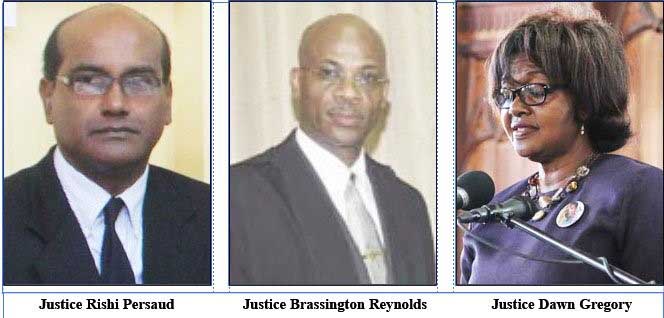
Moore was granted the injunction on March 18th, 2020 by Justice Franklyn Holder.
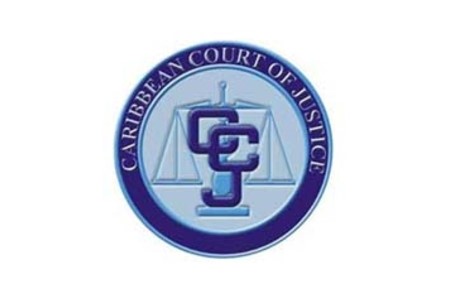
On March 31st, 2020, however, the Full Court nullified Justice Holder’s ruling; when the Chief Justice and Justice Naresh Harnanan ruled that the matters raised in Moore’s injunction application were better suited for an election petition rather than the way it was presented before the court.
Moore would, however, later appeal that ruling to the Guyana Court of Appeal.
In its ruling of April 7th, 2020 however, the Court of Appeal affirmed the Full Court’s order clearing the way for the recount.
The appellate court reiterated that while GECOM could proceed with a recount of the ballots cast, it could not abdicate or delegate its supervisory function over the election process, more particularly the recount of the ballots.
In a two-to-one decision, the Appeal Court allowed a sliver of Moore’s appeal in ruling that GECOM had the authority to do a recount of ballots but could not accord that power to any other body.
Just as the appellate court was delivering its ruling, the Elections Commission had voted that it would move ahead with the recount.
Thirty-three days
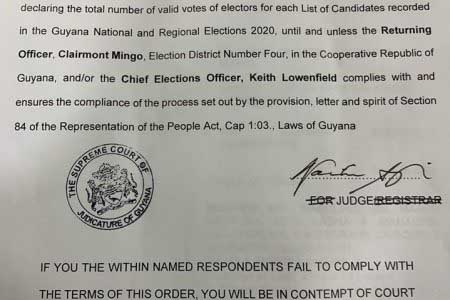
Following the recount, however, Coalition supporter Eslyn David moved to the court seeking among other things, an order preventing Lowenfield from presenting his final report.
The Court of Appeal by majority decision had issued an order that the words “more votes are cast” as per Article 177 (2) (b) of the Constitution should be interpreted to mean “more valid votes are cast” in keeping with the definition of valid votes as outlined in Order 60 of 2020 (Recount Order).
The interpreted Article then provided that “a Presidential candidate shall be deemed to have been elected as President and shall be so declared by the Chairman of the Elections Commission— if more valid votes are cast in favour of the list in which he is designated as Presidential candidate than in favour of any other list.”
This reading then left it up to GECOM to interpret the definition of “valid” as used in the regulation it crafted. GECOM had by that time already concluded that valid votes are those which have been tallied during the national recount exercise.
While Justice of Appeal Rishi Persaud ruled that David’s application was misconceived and dismissed it for want of Jurisdiction, both Justice of Appeal Dawn Gregory who led the panel and High Court Justice Brassington Reynolds decided that based on the wording of Article 177(4) there existed a limited jurisdiction for the Court to decide the validity of an election of a President based either on the qualification of the candidate or the interpretation of the Constitution.
The PPP/C would, however, later appeal that decision to the CCJ which threw out that ruling inserting the word “valid” into the consideration of votes for the election of a President.
The Court of Appeal ruling in effect facilitated Lowenfield’s report cutting over 115,000 votes. The Trinidad-based court of last resort would also rule that this report was of no effect.
The CCJ’s ruling sought to clear the way for GECOM’s Chair Justice Singh to immediately move for the declaration of the recount result which showed that it was the PPP/C which had won the elections.
This was, however, not done and yet another round of litigation was mounted by another Coalition supporter—Misenga Jones, who sought to challenge the tabulations from the recount. Her argument had been that it was the initial tabulations submitted by Mingo which ought to have been used for an official declaration.
Justice George-Wiltshire who also presided over this application ruled on July, 20th, 2020 that the CCJ had endorsed the recount of votes and that the ten old declarations from March 13th, 2020 could not be “resurrected”.
That finding was a major defeat in what were the newest attempts by an APNU+AFC supporter to prevent a declaration of a result from the March 2nd elections, using the recount results.
Jones would go on to appeal the ruling which was, however, also thrown out by the Court of Appeal.
In a unanimous decision, Justices Gregory, Persaud and Priya Sewnarine-Beharry ruled that Lowenfield had to submit his Section 96 report on the basis of the recount of votes.
That was the final litigation mounted before the official declaration on August 2nd, 2020 which saw the PPP/C taking office with its presidential candidate Irfaan Ali being sworn in.
The results of a national recount of all ballots cast showed that it was the PPP/C which had won the elections with 233,336 votes over the 217,920 which the coalition managed to secure.
The APNU+AFC coalition has since lodged an elections petition challenging the results of the polls, in which petitioners Claudette Thorne and Heston Bostwick want the court to determine among other things, questions regarding whether the elections have been lawfully conducted or whether the results have been, or may have been affected by any unlawful act or omission and in consequence thereof, whether the seats in the National Assembly have been lawfully allocated.
Two petitions were filed, but the other was thrown out based on the “fatal error” of not being properly served on the PNCR leader—former President Granger.
